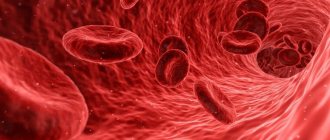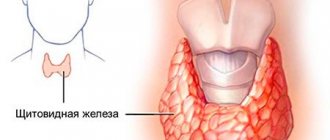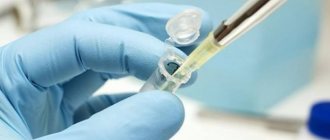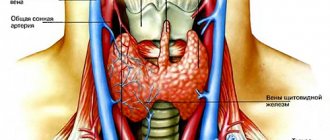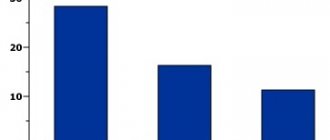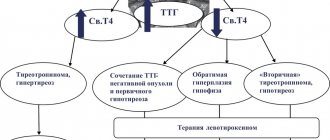General information about TSH
In order not to wonder why a hormonal substance is produced in one place, and its content is tested in the thyroid gland, it is necessary to become familiar with its main functions.
Due to thyroid-stimulating hormone, blood circulation in the organ improves, and iodine, delivered along with the bloodstream, is better absorbed by the gland. The element activates the production of:
- thyroglobulin;
- triiodothyronine – T3 hormone;
- thyroxine - T4 hormone.
The last two substances are responsible for metabolic processes associated with nutrients in the body (they include fats, proteins, carbohydrates). Hormones control the functionality of the digestive, reproductive and circulatory systems. They are also responsible for mental functions. Deficiency or excess of thyroid-stimulating hormone has a direct impact on the levels of triiodothyrone and thyroxine, and on the health of the body as a whole.
Features of thyrotropin include characteristic daily fluctuations in production. The maximum concentrations of the substance in the blood are recorded from 2 to 4 am, then they decrease, and the minimum level is determined after 17 pm.
If the patient prefers a nocturnal lifestyle, then the normal rhythm of hormone production is disrupted. A decrease in the amount of TSH is observed in pregnant women, and a slight increase and decrease in the release of the substance at night is observed in elderly people.
Long-term exposure to thyrotropin in elevated concentrations leads to changes in the tissues of the thyroid gland, increasing its size and weight. The result of the influence is functional hypertrophy of the organ.
Thyroid-stimulating hormone. Description
The most common, most prescribed hormonal test today is a blood test for TSH.
Thyroid-stimulating hormone, also known as thyrotropin, is a hormone that is released into the blood by cells of the pituitary gland, a very small but very important endocrine gland located in the cranial cavity. Pituitary hormones regulate the activity of all other endocrine glands in the body. Thyroid-stimulating hormone acts on the cells of the thyroid gland (thyrocytes), stimulating them to produce the hormones thyroxine (T4) and triiodothyronine (T3). T4 and T3 are called thyroid hormones. There are special sites on the cells of the thyroid gland to which thyrotropin attaches, they are called TSH receptors. After the TSH hormone attaches to the receptor, the thyroid cell receives a signal that it needs to increase the production of hormones. The blood flow in the thyroid gland increases, its cells begin to more actively capture iodine molecules, synthesize and release T3 and T4 into the blood, and the proliferation of thyrocytes is activated.
The release of TSH by the pituitary gland occurs throughout the day with a slight increase in the evening.
When the body has a deficiency of thyroid hormones in the blood, the pituitary gland increases the production of TSH. On the contrary, if there is an excess of thyroid hormones in the body, then the synthesis of TSH by the pituitary gland decreases. This is due to the fact that thyroid hormones (mainly T3) act directly on the pituitary gland, inhibiting the production of TSH. These processes do not occur quickly - the concentration of TSH in the blood changes over several weeks. Therefore, more frequent determination of TSH in the blood is impractical.
Let's look at the two most common situations of thyroid dysfunction - hypothyroidism (lack of thyroid hormones) and thyrotoxicosis (excess of thyroid hormones).
Hypothyroidism, caused by thyroid disease or removal of part of the gland, reduces the number of cells capable of producing thyroid hormones. The concentration of T3 and T4 in the blood decreases. The inhibitory effect of T3 on the pituitary gland is weakened. The pituitary gland increases the production of TSH. Thyroid-stimulating hormone stimulates thyroid cells to increase the synthesis of T3 and T4 to restore their normal levels. When examining TSH, T3 and T4 in the blood, we will find an increase in TSH, and T3 and T4 are within normal limits. This is called subclinical hypothyroidism. With a further decrease in the number of thyrocytes, even increased stimulation of them with thyroid-stimulating hormone no longer restores the normal level of T3 and T4 in the blood. TSH is increased, and T3 and T4 are decreased - this is called manifest hypothyroidism, it definitely requires treatment.
In thyrotoxicosis, thyroid cells release too much T3 and T4 hormones into the blood, which inhibits the production of TSH by pituitary cells. The level of TSH in the blood decreases to zero, this reduces the stimulating effect on thyrocytes and the concentration of T3 and T4 returns to normal. TSH in the blood will be below normal, and T3 and T4 will be within normal limits - this is subclinical thyrotoxicosis. With further progression of the disease, despite the TSH level reduced to 0, the hormones T3 and T4 will be higher than normal. This is called overt thyrotoxicosis and requires immediate treatment.
Since in both hypothyroidism and thyrotoxicosis, TSH changes earlier than the thyroid hormones themselves, T3 and T4, it is the study of TSH in the blood that is usually used to assess the functioning of the thyroid gland. A blood test for TSH allows you to detect thyroid disease at an early stage, when there may not yet be clinical manifestations, or they are subtle.
Indications for testing and TSH norms
The level of hormonal substances is controlled in certain cases:
- to identify latent hypothyroidism;
- during therapeutic procedures aimed at combating toxic goiter;
- for dynamic observation - the procedure is prescribed twice a year for patients with registered hypothyroidism;
- determining the causes of infertility in women and men;
- for amenorrhea, depression, hyperprolactinemia.
In childhood, tests are taken to search for the source of mental and sexual development delays.
Standard TSH indicators are arbitrary; each laboratory has its own table, which determines the increase and decrease in the level of the hormone contained. Approximate thyrotropin standards are indicated in mIU/l:
- for newborns – from 1.1 to 17;
- babies under 2.5 months - from 0.6 to 10;
- from 2 to 5 years – from 0.4 to 6;
- from 5 to 14 years – from 0.4 to 4 units.
In order not to wonder about the decoding of laboratory data, it is enough to ask the attending physician for an explanation.
Causes of increased thyroid-stimulating hormone
Changes in the direction of increasing TSH levels may be associated with:
- with a benign neoplasm in the pituitary gland – thyrotropinoma;
- adenoma in the anterior pituitary gland;
- syndrome of resistance to hormonal elements of the thyroid gland;
- irregular production of thyrotropin;
- juvenile hypothyroidism, other formations in the pituitary gland;
- subacute thyroiditis;
- chronic pathologies, including mental illnesses;
- removal of the gallbladder, lead intoxication;
- excessive physical activity, hemodialysis procedures;
- preeclampsia.
The element may increase during therapy with certain medications:
- anticonvulsant action - during treatment with Benserazide, Phenytoin;
- beta blockers - Atenolol, Metaprolol;
- Morphine, Prednisone, Rimphapicin.
A similar deviation occurs during therapeutic procedures using iodides and Calcitonin.
Reasons for low TSH
A decrease in hormone levels is observed:
- with diffuse toxic goiter;
- thyrotoxic adenoma;
- postpartum necrosis of the pituitary gland;
- latent thyrotoxicosis;
- pituitary injuries;
- nervous breakdown or starvation due to diet;
- attempts to independently regulate the amount of T4 and the subsequent development of thyrotoxicosis.
A drop in TSH levels can be observed in pregnant women with hypothyroidism.
Changes in the direction of decreasing hormone levels occur when using certain medications. The list includes anabolic steroids, glucocorticosteroids, cytostatics, antihypertensive medications and other drugs.
Why take a TSH (thyroid-stimulating hormone) test?
Other names : Thyroid-stimulating hormone, thyrotropin, Thyroid-stimulating Hormone (TSH), Thyrotropin.
The thyroid gland is small and butterfly shaped. It produces hormones (thyroxine, triiodothyronine) that play an important role in regulating normal growth, development, metabolism, body temperature and blood flow. Thyroid hormones also influence the metabolism of fats, proteins and carbohydrates, maintaining fluid and electrolyte balance, muscle strength and emotional status.
TSH is produced by the pituitary gland, a gland in the brain that is located in a bony pocket called the sella turcica and controls the functioning of the thyroid gland. When the level of thyroid hormones in the body is low, the pituitary gland produces more TSH. Conversely, when thyroid hormone levels are high, the pituitary gland produces less TSH.
TSH levels that are too high or too low may indicate that the thyroid gland is not working properly.
You may need a TSH if you have symptoms of too much thyroid hormone in your blood (hyperthyroidism) or too little thyroid hormone (hypothyroidism).
Symptoms of hyperthyroidism : anxiety, fussiness, weight loss, trembling of the body and fingers, increased heart rate, irregular heart rhythm, bulging eyes, poor sleep, irritability, increased sweating, heat intolerance, frequent loose stools, swelling of the feet, muscle weakness, menstrual irregularities cycle, up to amenorrhea.
Symptoms of hypothyroidism: weight gain, decreased heart rate, shortness of breath when walking, chilliness, increased fatigue, slow speech, decreased mood, hair loss, brittle nails, dry skin, nausea, constipation, facial swelling, menstrual irregularities in women.
How to interpret the results of a TSH test
A high TSH level may indicate that the thyroid gland is not producing enough thyroid hormones (hypothyroidism).
Level up:
- primary hypothyroidism;
- Hashimoto's thyroiditis;
- TSH - secreting tumor of the pituitary gland;
- intense physical activity;
- adrenal insufficiency;
- gestosis of pregnant women.
Low TSH levels may mean that the thyroid gland is producing too much thyroid hormone (hyperthyroidism or thyrotoxicosis). If the body does not produce enough TSH, proliferation occurs - the growth of thyroid tissue. The thyroid gland increases in size, this condition is called goiter.
Level downgrades:
- diffuse toxic goiter;
- TSH-independent thyrotoxicosis;
- thyrotoxic adenoma (Plummer's disease);
- transient thyrotoxicosis of pregnant women;
- mental illness;
- emotional stress;
- starvation.
The TSH test does not explain why TSH levels are too high or too low. If the test results are different from the norm, then additional tests must be performed to determine the cause of this condition.
As additional studies, the levels of free fractions of thyroxine (free T4) and triiodothyronine (free T3) are most often determined.
To confirm autoimmune thyrotoxicosis (Graves' disease), the level of antibodies to the TSH receptor is examined.
To diagnose hypothyroidism of autoimmune origin (Hashimoto's disease), the levels of antibodies to thyroid peroxidase (TPO) or antibodies to thyroglobulin (TG) are examined.
What else you need to know about the TSH test
Changes in the functional state of the thyroid gland can occur during pregnancy. These changes are usually minor, but some women may develop thyroid disease. Hyperthyroidism occurs in about one in 500 pregnant women, while hypothyroidism is more common, affecting about one in 250 pregnant women.
Both hyperthyroidism and hypothyroidism can persist after pregnancy. If thyroid function is impaired during pregnancy, it must be monitored after the birth of the child.
If you are pregnant or planning to become pregnant and have a family history or family history of thyroid disease, be sure to consult with your healthcare provider.
It is also important to know that the level of TSH in the blood can fluctuate depending on the time of day: at 2–4 o’clock in the morning the level of this hormone is very high, while the minimum level is around 17–18 o’clock in the evening.
To get an accurate value, a TSH test must be taken in the morning on an empty stomach. The day before, you should stop smoking, drinking alcohol, eating large meals, and you should also avoid physical and emotional stress.
Method: electrochemiluminescence immunotest
Analyzer : Cobas 6000
Units: µIU/ml
Material for research: venous blood serum
Preparation for TSH:
- Take on an empty stomach (after sleep and 8-12 hours of fasting). It is permissible to drink only clean non-carbonated water (up to 200 ml) (with the exception of glucose testing).
- Do not consume spicy, fatty, fried foods or alcohol 1-2 days before the test.
- Avoid physical and emotional stress 1 day before the test.
- Do not smoke for at least 1 hour before the test.
- It is not recommended to take it after X-rays, physiotherapeutic procedures and instrumental examinations.
- On the morning of the test, skip taking thyroid medications and take it after donating blood.
Interpretation of results (transcript)
The result of laboratory tests is not a sufficient basis for making a diagnosis. Interpretation of the results and diagnosis is carried out only by the attending physician.
Reference values:
| Children from 0 to 12 months | 0,73–8,35 |
| Children from 12 months to 6 years | 0,7–5,97 |
| Children from 6 to 11 years old | 0,6–4,84 |
| Children from 11 to 16 years old | 0,51–4,3 |
| Adults over 17 years old | 0,27–4,2 |
Factors influencing the result:
Promotion:
- taking medications - anticonvulsants (valproic acid), beta-blockers (atenolol), amiodorone, antipsychotics, clomiphene, furosemide, morphine, prednisolone, radiocontrast agents, oral contraceptives, etc.
Demotion:
- taking medications: corticosteroids, anabolic steroids, cytostatics, beta-adrenergic agonists (dobutamine, dopexamine), dopamine, thyroxine, triiodothyronine, nifedipine, drugs for the treatment of hyperprolactinemia (metergoline, peribedil, bromocriptine), carbamazepine, somatostatin and octreotide, etc.
Where to get tested for TSH
You can take a blood test for TSH at any Synevo point in Minsk, Baranovichi, Bobruisk, Borisov, Brest, Vitebsk, Gantsevichi, Gomel, Grodno, Zhlobin, Lida, Mogilev, Mozyr, Molodechno, Novogrudok, Novopolotsk, Orsha, Pinsk, Polotsk, Rechitsa , Svetlogorsk, Slutsk, Smorgon, Soligorsk.
